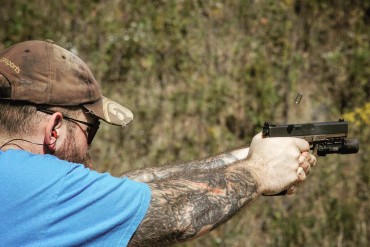So obviously in working at a gun store I get asked pretty frequently what caliber is best for _____ situation. While it would be nice if there was some sort of magic death ray I could suggest to people, there isn’t, and most people have a pretty flawed understanding of what actually happens when a bullet interacts with a human target anyway. Here’s my take on it, and my reasoning behind selecting 9mm.
So for starters, let’s examine a couple of concepts that don’t actually exist in the scientific world but everyone talks about anyway. I’m going to regurgitate the work of some better people than myself in this post, but the information is still worth paying attention to.
- Knockdown Power – This doesn’t actually exist. If a bullet had enough force to “knock down” an individual then it would also “knock down” the individual firing the gun. People do not go flying through the air when hit by a bullet, contrary to what the movies and television would have us believe, Newton’s Third Law and all.
- Energy Dump – You know how a lot of ammo manufacturers will list the foot pounds of energy that any given round has on the back of their boxes? Well that doesn’t actually matter. The terminal performance of a projectile is determined solely by how much tissue it cuts, crushes, or tears. While it has been advocated by many a
gun counter commandomisinformed individual that some sort of energy transfer occurs between a projectile and it’s target, this has been rejected by everyone I respect who studies terminal ballistics for a living. - 9mm is for girls and sissies – How often have you heard that if you’re not carrying a caliber that “begins in 4 and ends in 5” you’re doing it wrong? This almost makes sense if we are limited to non expanding ammunition, but hey most of us aren’t. When we compare modern hollow points in the popular service calibers there is on average 1/10th of an inch difference in expanded diameter between 9mm and .45 ACP. Grab a ruler and look at 1/10th of an inch. It doesn’t seem like much does it? Yeah, that’s because it’s not. Fun fact: In actual autopsies conducted on gunshot wound victims the wound track created by a 9mm is indistinguishable from that created by a .45 ACP.
The only advantage that a larger caliber is going to offer you in my mind is slightly better performance through intermediate barriers. That’s not to say that the smaller caliber doesn’t perform well through intermediate barriers, just that the larger ones perform slightly better. Probably one of the more commonly encountered intermediate barriers is the front or rear windshield of a car. Tempered auto glass has a nasty tendency to deflect bullets from their original course as well as separate jackets from their cores. It’s for this reason that .40 S&W gained so much popularity in law enforcement circles beginning in the early 90’s. The nice thing is that with modern designs most service ammunition is going to perform pretty well through barriers and it is for this reason that a lot of larger law enforcement departments are switching back to or have been using 9mm all along. Some notable examples being NYPD, and our very own Cincinnati PD which is using the 9mm 147gr Ranger T-series fired from the Smith and Wesson M&P9.
So since I’m happy with the 9mm’s performance through barriers, and since all handgun calibers suck anyway here’s why I like 9mm.
- Capacity – “Damn, I wish I didn’t have so much ammo.” Is not something I’ve ever known anyone in a gunfight to say after the fact. The whole “If you can’t get it done in 6, then it ain’t gettin’ done.” is asinine, and something that I hear so often it makes me want to rip out what remaining hair I have left. None of us are mind readers, and if we could predict before hand how many rounds we would need to stop a threat then why the hell wouldn’t we just avoid the threat entirely in the first place? More rounds are a good thing, if you think differently I’m going to have to politely disagree with you, and think nasty thoughts about your intelligence quietly to myself.
- Recoil – Can I shoot a .40 or .45 as quickly as I can a 9mm? Sure I can. Can I shoot a .40 or .45 as quickly and accurately as I can a 9mm? I sure wish I could, and there are some people that can, but I’m not one of them. If I’m shooting strong hand or weak hand only it gets even worse. In any FoF (force on force) exercise I’ve ever participated in someone gets shot in the hand. So with that in mind, being able to put rounds on target quickly with one hand seems important to me.
- It’s Cheap! (Relatively) – 9mm is cheaper than any of the other service calibers. Cheaper = more ammo. More ammo = more practice. And obviously more practice = awesome. Since I’m a fan of awesome, it all works out pretty well for me.
So there you go, the logic behind why I’ve chosen 9mm as my preferred handgun caliber. Obviously the choices you make are going to be determined by your circumstances and personal preferences, but hey, at least you know why 9mm gives me the warm and fuzzies it does now. For a much more detailed and intelligent take on the subject check out Service Caliber Handgun Duty and Self-Defense ammo by Dr. Gary Roberts.


Good read. With few exceptions. most semiautos made in .40 S&W were designed originally for 9 mm. Especially with the polymer pistols, the difference in recoil between the same sized gun in both calibers is somewhere between noticeable and unpleasant.
That has certainly been another factor for me as well. a 300-500 round practice session with .40 S&W exacerbates some previous arm and shoulder injuries I’ve sustained to a point that the next day I’m unable to function at 100%.
I regulalry hear that when one is stuck with ball ammo that the larger calibers are a better choice, yet I have seen very little solid evidence that this is true.
In a military context the 9mm is far better able to penetrate some barriers, such as canteens, magazine pouches, steel helmets, etc.
Becoming emotionaly attached to one’s caliber choice while disregarding logic and scientific evidence is a mindset failure IMHO.
I think I can safely categorize myself as a .40 hater, and oddly military is one of the places I think there’s a real use for the caliber. The flat meplat on .40 FMJ would theoretically offer an advantage over the round profile on 9/.45 FMJ. But hey, maybe we could just stop following The Hague convention even though we never signed it. That’d be awesome.
I’ve seen a number of people shot with .40 FMJ. Not impressive. Seriously, the “better” part as all theory in my observation.
I liked the .45acp until taking some advanced pistol training. I shot the .45acp really well but at the end if a day of extended shooting my freaking hands just hurt and my wallet. I couldn’t do good accurate followup shots all day long. Switching to the 9mm all that discomfort went away. Shooting a 4 day class is still a matter of pain in the wallet buying the ammo at today’s market but that will ease.
After one learns trigger control and reset, good support hand wrist locked, thumbs forward recoil controlled grip with a standard capacity (12 to19 rds) 9mm with a quality hollow point, mental and physical comfort just follows. I’m a big fan of HST 147gr 9mm.
Could you please direct me to the ballistic studies you referenced in the article? Not that I don’t believe you, I just like to read this kind of information for myself. Great article, I agree with all points made.